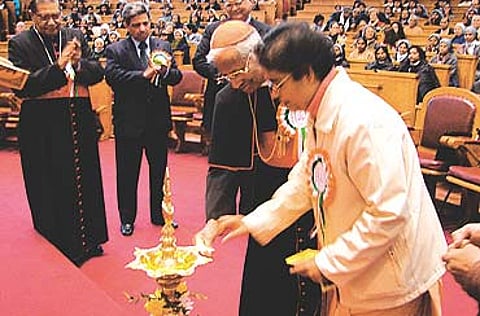St Thomas, Turnabout
Evangelisation isn't always an eastward wave. It's Indian 'shepherds' who're flocking to the West.
- Indian Catholic priests and nuns are increasingly in demand in the West, which has a dearth of new recruits
- The flow of missionaries is now from East to West, over 20,000 Indians serve in Catholic institutions in Europe, US
- Valued for their qualities of head and heart, they serve as parish priests, in hospitals, also as professors, managers
- Prominent Indians in the Vatican hierarchy include Cardinal Ivan Dias, former Archbishop of Bombay; Father Thomas Reddy who heads Archivum Romanum; Archbishop Francis Chullikat, the Vatican's envoy in Iraq; Fr Jacob Srampickal, who heads Communications at the Pontifical Gregorian University; Monsignor Felix Machado who leads the Vatican's inter-faith dialogues

Father Jacob Srampickal, a Keralite and director of communications at the prestigious Pontifical Gregorian University, says Indian priests are much appreciated in Europe because they do their work with a personal touch. They are still willing to go to people's homes to administer and organise family prayers. "They are very different from the formal and ritual-based ways of the local priests. Their attitude is more humane, compassionate and hospitable, which is part of our Indian culture," he adds. There is also a financial spinoff because they send a large percentage of their earnings back to their bishops in India.
Coming from a multi-religious, multi-ethnic society, Indian Catholics have helped in the cultural integration of immigrants, even in inter-religious dialogue. In fact, an Indian, Monsignor Felix Machado, has been at the forefront of the Vatican's inter-faith dialogue, participating in joint prayers with Hindu, Jain, Muslim and Buddhist priests and youth in Assisi. While the upper layers of the Vatican, including the Pope, appear to be hardening their stand on how and why a dialogue should be conducted, Indian priests have an instinctive feel for living with other religions. "I feel the future of Christianity to a big extent depends on accepting cultural diversity and fostering respect for other religions, with which Indian priests seem to be much at home," says Father Srampickal.
Father Reddy says that being from a "positive culture" is helpful in Rome where Catholics from different parts of the world congregate. "We are more ecumenical. Sometimes I try preaching Gandhiji's principles of non-violence and not differentiating between colour and creed," he said.
The Vatican won't officially comment on the special grace Indians bring, or their blending of Hindu practices into Catholic rituals, for to acknowledge would be to concede. And Rome resists dilution—practical or philosophical.
Tags